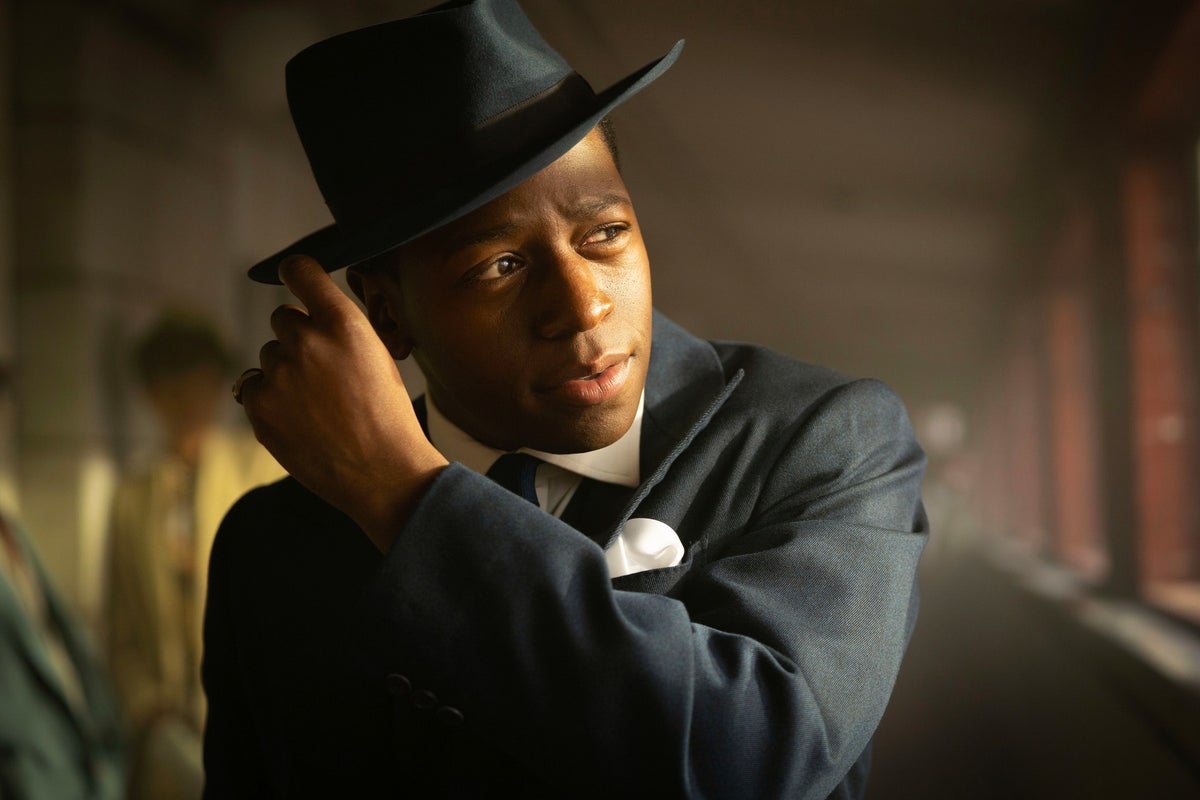
“How can someone murder three people in an English village without it being noticed?” This simple question is at the heart of what has made Agatha Christie the world’s most popular novelist. How is it that England’s green and pleasant land can be so riddled with people willing to poison, stab and bludgeon their neighbours? It is a premise that has become a core part – ho ho ho! – of the BBC’s festive programming, which returns this year with a 1950s spin on Christie’s 1939 novel, Murder Is Easy.
On the train to London, Luke Fitzwilliam (Rye Lane’s David Jonsson), freshly arrived from Nigeria, encounters a curious old lady, Lavinia Pinkerton (Penelope Wilton). “I have to report,” she tells the young civil servant, ominously, “murder.” Miss Pinkerton has, she believes, witnessed two – maybe three – murders, but before she can arrive at Scotland Yard she’s mowed down by a rogue motorist. Coincidence? Not in the mind of Fitzwilliam, who immediately heads to Miss Pinkerton’s village, Wychwood, to investigate the crimes. There, he teams up with Bridget Conway (The Rings of Power’s Morfydd Clark), a former secretary who is now engaged to the obnoxious Lord Whitfield (Tom Riley). As they nose around the village’s business, their mutual attraction grows, just as the body count rises.
On his jaunt in the country, Fitzwilliam encounters a bevy of British TV character actors: Tamzin Outhwaite, Mark Bonnar, Mathew Baynton, and Douglas Henshall (among others). It may not quite match the wattage of the 1974 Murder on the Orient Express (Sean Connery, Lauren Bacall, Ingrid Bergman, John Gielgud, Vanessa Redgrave) or the 1978 Death on the Nile (Mia Farrow, David Niven, Jane Birkin, not to mention Maggie Smith and Bette Davis), but it’s a decent lineup. The sort of decent lineup we’ve grown accustomed to in recent festive Christie adaptations. With Kenneth Branagh doing his big screen best (which is not very good) tackling the Poirot novels, the BBC has chosen to adapt a series of Christie’s less celebrated standalone works: The Pale Horse, Ordeal by Innocence, Witness for the Prosecution, and now Murder is Easy. It is a decision that gives them the freedom to experiment, without fear of being held in contrast to the great adaptations of the past.
That freedom here is best expressed by a new interest in late-colonialism and middle England’s racism. Jonsson’s Fitzwilliam represents the first time a Christie protagonist has been played by a Black actor, and the narrative embraces that new development. “Behold the imperial African,” Fitzwilliam’s friend at the West Africa Club announces. “Self-colonised, collaborating with his oppressors.” As with all creative decisions that promote a more diverse and inclusive agenda, it will provoke both the tabloid media and easily offended viewers, but many of Christie’s works are thoroughly engaged with the consequences of empire. Bringing the action forward by a couple of decades allows the creators to gerrymander some more progressive ideals into the story. While Christie’s views might not have been expressed in quite such bluntly liberal terms (“Gordon likes to collect nice things,” Bridget observes, of her fiance’s treasury of African artifacts; “Not really his nice things though, are they?” Fitzwilliam responds), there has always been a sufficiently distinguishable native thread of interest in these matters for it to be extrapolated out to a broader canvas.
This is something the show does well enough, but it is one of the few things to achieve even basic competence. Where Sarah Phelps’s adaptations for the BBC (And Then There Were None, for example, or her reimagining of The ABC Murders) were shrouded in a very modern darkness, Sian Ejiwunmi-Le Berre’s adaptation of Murder is Easy falls between two stools. Too bland to excite the violent impulses of the Line of Duty generation, yet insufficiently zippy or playful to stir Christie aficionados. The script is only part of the problem: more striking, perhaps, is the cheapness of the design. Rather than shooting for the murkiness of Scandinoir, Murder is Easy manages to be both over-saturated and over-exposed, while the costumes, locations and cars all have that counter-intuitively anachronistic air of being “vintage”. It is striking that, in the 34 years since David Suchet’s Poirot first aired on ITV, the aesthetic quality of Christie adaptations seems to have regressed.
Against this unsatisfying backdrop, Jonsson tries hard to assert his authority. It is never easy playing a disposable dick – neither Poirot nor Marple; never going to spark a franchise – but Jonsson is not aided by what the kids are calling CRF (chronic rizz face). “Bridget, why are you marrying that man?” he purrs at Clark’s vivacious temptress. Both are in the Tommy and Tuppence mould – spunky and selfless – yet, like most things with this adaptation, more washed out than intended. They navigate their way around a convoluted plot like Theseus delicately, clumsily, returning to Ariadne.
If British television wishes to continue adapting Christie’s novels – which doubtless it does, given there are many that are yet to receive a primetime airing – then they’d be advised to remember what makes them so popular. Propulsive, compulsive plots, a distinctive vision of Britain in the first half of the 20th century, and a radical, by the standards of modern mysteries, coherence. Murder might be easy, but a good murder mystery is far less straightforward.







